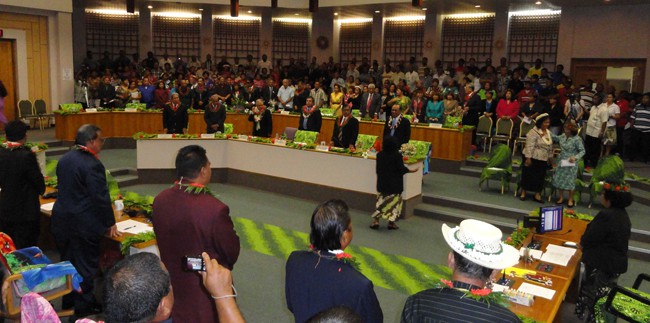
What is so hard about good governance in the Pacific?
Why does it seem so difficult in many Pacific island governments to gain political, policy and implementation level action for good governance and the use of what some people like to term “best practice”? Throughout the region, many workers in the civil service and elected leaders seem to view the government as their own private business. There are, of course, exceptions, but they tend to be a minority. The results of this prevalent attitude are apparent in low government work performance and show in health, education and poverty indicators.
A recent commentator said that on average 30 percent of donor aid is wasted through a combination of poor management and theft. My question: Is that all? And if we accept the 30 percent waste figure, what is the collateral waste and damage from the many people engaged in either mismanaging or stealing the aid funding? While busy manipulating funds for personal benefit, those officials are not doing their real jobs, so there is further loss and inefficiency built into the corruption picture. Then, too, poor management and corruption often is not penalised. So it produces a malaise among others—those trying to actually do their jobs in a poor-governance environment—depressing morale and killing incentive to improve performance.
A recent $1.2 billion loan by the Papua New Guinea government, the appointment and then appointment rescinding of an individual with links to Hezbollah by the Marshall Islands as its envoy to UNESCO, Kiribati selling fishing days beyond its allotted share within the eight-member fishing cartel known as PNA, the Nauru government summarily getting rid of judges in its judiciary, the use of civil service apparatus in many islands to hire close relatives of high-ranking government leaders, bribery of government officials to get contracts, approving agreements with foreign companies for extraction of natural resources by signing contracts provided by the companies. What do these disparate actions have in common? Each of these activities, no matter how they are defended, is an example of bad governance. In one way or another, each of these ignores best practice rules, the purpose of which are to benefit the public and reduce abuse of power by those who hold it in the executive and legislative branches.
As recently as 20 years ago, prior to widespread use of Internet and television in the islands, elected leaders and high-level civil servants could make government decisions for personal benefit and it could be months or even years before the public became aware of it.
The Internet age has helped expose corruption by making information more easily accessible. But it doesn’t seem to have reduced corruption for fear of exposure and penalty. Is this because often a person being exposed for a corrupt practice does not suffer a penalty (such as going to jail or losing the next election)? Some of this, what I call a “disconnect,” is based on what appears to be a belief in some islands that government is, in fact, for the benefit of people who are in it. Obviously, this is an attitude that needs to change if government performance is to change and improve.
Particularly in small islands, where people tend to know everything about everyone, most are reluctant to point the finger at those involved in corrupt practices or even just plain bad management. Why? Partly because a priority of life in small islands is getting along with everyone since you live and work so close together. Another is that there are many shades of corrupt practices or bad management woven into island societies as a result of foreign aid and the adoption of western styles of governance such that some may be reluctant to call others out for fear of having the finger pointed back at them.
Interestingly, this picture might be changing for the better—if “better” means pointing out corruption. With the filing March 20 of 52 criminal charges against a Majuro pharmaceutical company related to bribery to gain hospital contracts, a centre of corruption is being targeted by the Marshall Islands Attorney General and Auditor General. Many more charges against government workers allegedly involved are expected to follow. Perhaps the key point in the bribery scandal enveloping Majuro hospital is how services and morale have plummeted in recent years as corruption, poor management, broken diagnostic equipment, and lack of supplies and medicines have been the norm, undermining best efforts of doctors and nurses to maintain adequate services and weakening public confidence in the facility. These are the direct manifestations of corruption.
In response to the combination of the Marshall Islands Auditor General’s motivation to investigate fraud and the Attorney General’s willingness to file criminal charges, people are reportedly calling into the AG’s and Auditor General’s office with numerous corruption complaints. Will prosecution—even successful prosecution—of a few people cause change and improve honesty and performance of government managers? It did not three years ago, when half a dozen government workers were convicted of stealing hundreds of thousands of dollars in U.S. government grants to the ministry of health. The manipulation of health funds in the Marshall Islands continued.
Bottom line, the public suffers, whether it’s a local government or a traditional leader signing fishing rights away for a few dollars, or national government officials and elected leaders’ side-stepping laws, regulations and policies for large-scale loans, projects or appointments.
There is no easy answer to eliminating the most overt corruption, poor management or violations of rule of law. Having well-staffed auditor, ombudsman and special prosecutor offices can increase oversight of government money and catch some of the corruption. But until people in island communities begin viewing anti-corruption and good governance as a priority, many islands will likely continue muddling along the paths they are on: showing low performance and poor education, health and development indicators despite reasonably high levels of locally-generated resources or donor aid.

